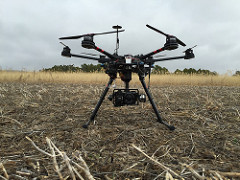Released: Dec. 19, 2016
$975,000 grant will help scientists employ UAVs to improve wheat breeding
The research will use drones in the process of developing better wheat varieties.

MANHATTAN, Kan. – The National Institute of Food and Agriculture (NIFA) has awarded $975,000 to Kansas State University for work that incorporates unmanned aerial vehicles in the process of breeding better wheat varieties.
The university’s work is designed to give scientists deeper understanding of in-field conditions so they can improve breeding programs in the United States and internationally.
Unmanned aerial vehicles (UAVs), more commonly known as drones, are quickly becoming recognized as a valuable tool for mapping agricultural crops. Kansas State University has been developing uses of UAVs to collect data on thousands of plots, including work in Kansas, Mexico and India.
“Perhaps the greatest bottleneck currently in plant breeding and genetics is effectively generating precision measurements of plant characteristics in the field,” said project director Jesse Poland, assistant professor of plant pathology and agronomy at Kansas State University.
“The goal of this project is to deliver in-season yield predictions by building models that combine genetic information from DNA sequencing and crop physiology that we will gather from UAV measurements on tens of thousands of breeding lines.”
For this grant, Poland said the university will use information from UAVs to evaluate large populations of candidate varieties under field conditions in wheat-breeding nurseries, then build a database that breeders can use when developing future varieties.
He said UAVs will provide “millions of collected images” that researchers will match with field values to develop a phenotype of wheat varieties. A phenotype is a complex map of an organism’s observable characteristics — such as its biochemical or physiological properties — and the influence of the environment on those characteristics.
The project, titled “Wheat Yield Prediction and Advanced Selection Methodologies through Field-Based High-Throughput Phenotyping with UAVs,” is funded for three years, beginning Nov. 1, 2016.
Scientists will use the phenotype to evaluate desired agronomic traits of wheat based on the UAV images at a speed and scale much faster and larger than what can be done by manual measurements, according to Poland.
Plot-level data will give wheat breeders real-time insight on crop performance that they can use to more precisely — and more quickly — improve future varieties.
“Plant breeding is really a numbers game,” Poland said. “If we can use new technologies like remote sensing with these low-cost UAVs, then we provide the breeders with the tools to look through many more candidate varieties and increase the chances of finding ones that are really excellent and can become the next best varieties to release to farmers.”
NIFA made the award to Kansas State University through the International Wheat Yield Partnership. The project includes scientists from Washington University in St. Louis; Cornell University; and the International Maize and Wheat Improvement Center, a network of 15 centers across the world that involves nearly 10,000 scientists, researchers, technicians and staff.
Poland also is director of the university’s Feed the Future Innovation Lab in Applied Wheat Genomics, which is funded by the U.S. Agency on International Development. Feed the Future is the U.S. government’s humanitarian initiative to address hunger and food insecurity throughout the world.
Learn more about the Innovation Lab by visiting wheatgenetics.org/research/innovation-lab
-30-
K‑State Research and Extension is a short name for the Kansas State University Agricultural Experiment Station and Cooperative Extension Service, a program designed to generate and distribute useful knowledge for the well‑being of Kansans. Supported by county, state, federal and private funds, the program has county Extension offices, experiment fields, area Extension offices and regional research centers statewide. Its headquarters is on the K‑State campus in Manhattan.
Story by:
Pat Melgares – melgares@ksu.edu or 785-532-1160
K-State Research and Extension
http://www.ksre.ksu.edu
For more information:
Jesse Poland - jpoland@ksu.edu or 785-532-6176
